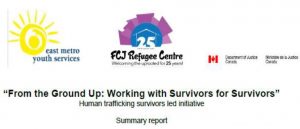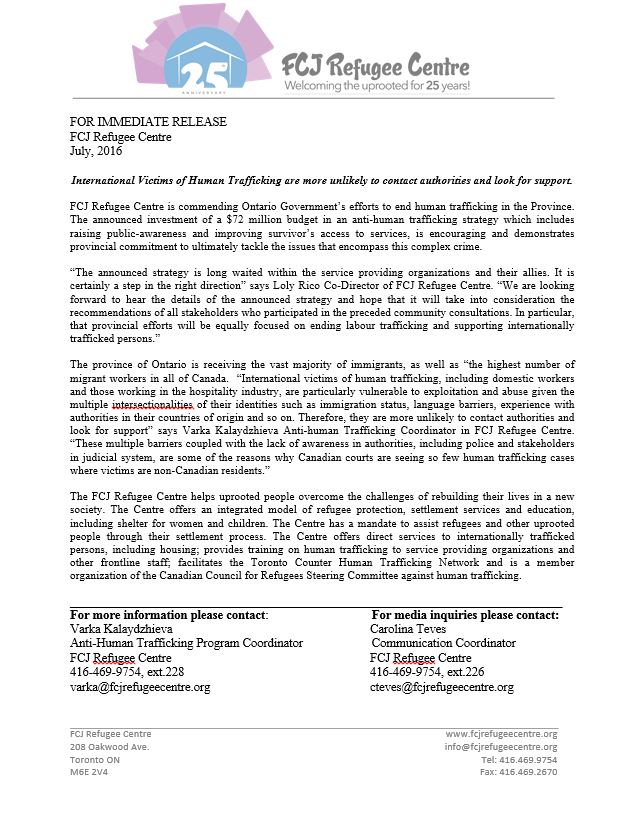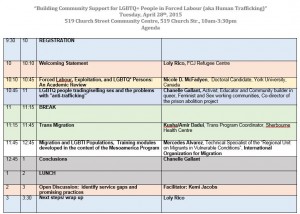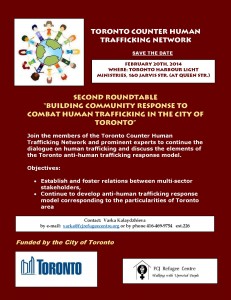Provincial efforts should be equally focused on labour trafficking and internationally trafficked persons who are particularly vulnerable to exploitation and abuse.
Members of the Toronto Counter Human Trafficking Network are embracing the Ontario government’s efforts to fight human trafficking by investing up to $72 million in an anti-human trafficking strategy aimed at increasing awareness and coordination, enhancing justice-sector initiatives and improving survivors’ access to services. The Network is praising the government’s approach promoting the 4Ps (Protection, Prevention, Prosecution and Partnership) thus, working collaboratively with all stakeholders, including civil society.
“We are welcoming the government efforts and anticipate that along with implementation of the new strategy, the government will address some of the root causes of human trafficking, such as gender inequality, rape culture, poverty, systemic racism and the marginalization of certain communities, including Indigenous youth” says Marissa Kokkoros, Executive Director of Aura Freedom International. “We also look forward to seeing increased prevention efforts, including the inclusion of anti-trafficking, anti-violence and gender-sensitive education included in school curricula.”
Loly Rico, Co-director of the FCJ Refugee Centre and President of the Canadian Council for Refugees said that “the announced strategy is long waited within the service providing organizations and their allies. It is certainly a step in the right direction. We are looking forward to hear the details of the announced strategy and hope that it will take into consideration the recommendations of all stakeholders who participated in the preceded community consultations. In particular, that provincial efforts will be equally focused on ending labour trafficking and supporting internationally trafficked persons who are particularly vulnerable to exploitation and abuse.” Her words are echoed by Joanna Yee, founder of Rehab Ministry who affirms that in their experience they “frequently encounter exploited immigrant women who are recent immigrants from China, East Asia, South Asia and Eastern Europe who have challenges integrating in the mainstream society but fall prey to traffickers. I found that this particular groups are gaining the least attention and hope that somehow they could get some attention for their plight.”
Forced marriages, the least familiar side of human trafficking, have also increased in numbers while the needs of survivors are not met adequately. “We hope that efforts will be made to include survivors and those at risk of forced marriage in all aspects of the strategy to address human trafficking. Many forced marriages involve the trafficking of victims both locally and internationally” said Shirley Gillett, coordinator of the “I Do!” Project. She also adds that “survivors face isolation and abandonment if they are able to flee, making them easy targets for other forms of trafficking, most commonly sexual exploitation. Some who remain in forced marriages may also become victims of forced sexual exploitation or forced labour, perpetrated by the families into which they have been married. Their needs should be recognized both in terms of how they differ from, as well as how they are intertwined with the needs of survivors of other forms of trafficking.”
The mandate of the Toronto Counter Human Trafficking Network is to provide a comprehensive response to human trafficking in the Toronto area. The response is to be provided in a collaborative manner with governmental and non-governmental organizations, agencies and individuals. The Network is committed to work towards the elimination of human trafficking in Canada and abroad, and to address the plight of trafficked persons through a holistic, human rights-based approach, focused on the needs of trafficked persons.
___________________________________________________________________
For more information contact
Varka Kalaydzhieva
Anti-Human Trafficking Program Coordinator
FCJ Refugee Centre
416-469-9754, ext.228
varka@fcjrefugeecentre.org








